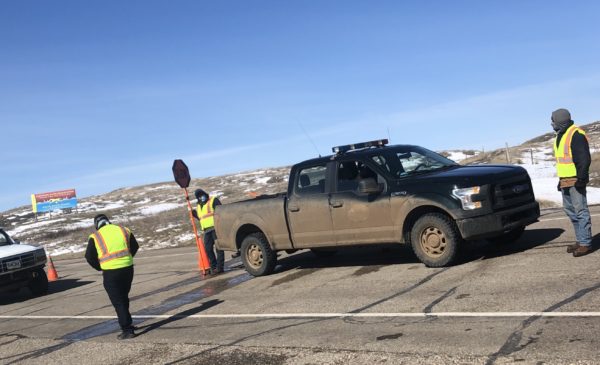
- Details
- By Levi Rickert
Opinion
This past weekend, the national news was all over the unfolding showdown between the Cheyenne River Sioux Tribe, the Oglala Sioux Tribe, and South Dakota Governor Kristi Noem who on Friday threatened the two tribes with legal action if they did not take down their checkpoints within 48 hours. The checkpoints were put up to curtail traffic into their reservations during the COVID-19 pandemic.
Chase Iron Eyes, a spokesperson for the Oglala Sioux Tribe, after receiving the governor’s letter on Friday, told Native News Online that the checkpoints were installed to keep outsiders out and insiders in the reservation to curtail the spread of the deadly coronavirus.
There is valid reason for concern from tribal leaders across Indian Country in dealing with the COVID-19 pandemic. Tragically, Indigenous peoples of the American continents have had to deal with foreign diseases brought by Europeans throughout history. Their history is stained with disease and death. Some historians and scientists maintain that between 80 – 90 percent of Indigenous peoples died of foreign diseases that their immune systems could not tolerate.
The Cheyenne River Sioux Tribe Chairman Harold Frazier and Oglala Sioux Tribe President Julian Runner Bear have decided that Noem can take them to court. They maintain that the sovereignty of tribes allows them to make their own laws for the safety of their tribal citizens.
Thus, the checkpoints were installed after mindful consideration by tribal leaders. On Sunday, they did not relent to Governor Noem’s threat of legal action.
The strained relations that South Dakota tribes have with Governor Noem did not start with the current coronavirus threat.
In May 2019, the Oglala Sioux Tribal Council unanimously voted to tell Republican South Dakota Governor Kristi Noem she is unwelcome on the Pine Ridge Reservation until she rescinds her support for anti-protest legislation. Two additional Sioux tribes — Cheyenne River and Yankton — expressed their solidarity with the Oglala Sioux Tribe.
 South Dakota Gov. Kristi Noem
South Dakota Gov. Kristi Noem
At issue was that Noem, a first-term Republican governor, was pushing the “riot boosting” legislation that according to the tribes unfairly targets them and their allies. After Standing Rock, one of the largest public protests during the last century against big oil, state lawmakers in Republican-controlled legislatures passed state statutes that forbid protests of 10 or more people.
Interestingly enough, had Michigan had such a law the recent protests at the state capitol in Lansing would have been prohibited.
Lawmakers pushed the riot boosting legislation through the South Dakota legislature and it was signed into law by Noem. A state court found the law unconstitutional.
Earlier this year, with some modifications made, Noem is working on getting it through the legislature so she can sign it into law.
Other states in the Great Plains region, fearing large protests by American Indians and their environmental groups’ allies to the Keystone XL pipeline, have already been signed into law.
The current showdown with the tribes may be something Noem welcomes. According to The South Dakota Standard’s columnist Tom Lawrence, Noem is seen as a rising star in the Republican party and does not particularly enjoy the politics of being the South Dakota governor. According to Lawrence, the governor has gotten close to Corey Lewandowski, a former campaign manager to President Donald Trump in the 2016 campaign. He has advised Noem to seek conflict and to engage in political battles whenever possible.
The tribal checkpoint showdown fits this type of go-for-the-jugular approach to politics embodied by Trump and his cronies. With her threat to the tribes, she is working on the politics of divisiveness rather than bringing people together in unity during these tough times. The Trumpters love to argue and divide people rather than bring them together.
Noem may have received other prompting for this showdown from the U.S. Department of the Interior – Indian Affairs. On April 14, 2020, Chairman Frazier, who is the president of the Great Lakes Plains Tribal Association, called for the resignation of Assistant of the Interior Tara Sweeney, who assisted in making a determination to allow the eligibility of Alaska Native Corporations to receive funds from the CARES Act.
Frazier found fault with a letter, dated April 8, from Darryl LaCounte, director of the Bureau of Indian Affairs (BIA), sent Frazier a letter that said the checkpoints on the Cheyenne River Indian Reservation are illegal. Frazier basically ignored it and kept the checkpoints intact.
 Levi Rickert
Levi Rickert
It should be noted that several tribes, including the Navajo Nation, have checkpoints at their borders. The BIA has not asked any other tribe to remove checkpoints.
Noem’s Friday letter references the BIA April 8 letter.
As this checkpoint saga unfolds, Noem will discover Frazier and Runner Bear are warriors who welcome a good fight. If she wants a political battle, the Sioux nations will give her one.
Levi Rickert (Prairie Band Potawatomi Nation) is the publisher and editor of Native News Online.
CORRECTION: An earlier version of this column said Chairman Frazier called for Assist. Secretary of the Interior - Indian Affairs' resignation in late March. His letter was not sent until April 14, 2020.
More Stories Like This
Native News Weekly (August 25, 2024): D.C. BriefsCadiz, Inc. Announces EPA Selection of Mojave Groundwater Bank Northern Pipeline Project for WIFIA Loan Application
Jesse Jackson, Who Bridged Civil Rights Struggles for Blacks and Native Americans, Dies at 84
SAVE THE DATE: GVSU’s “Celebrating All Walks of Life” Powwow Set for April 4th
Monday Morning: (February 16, 2026): Articles You May Have Missed This Past Weekend
Help us defend tribal sovereignty.
At Native News Online, our mission is rooted in telling the stories that strengthen sovereignty and uplift Indigenous voices — not just at year’s end, but every single day.
Because of your generosity last year, we were able to keep our reporters on the ground in tribal communities, at national gatherings and in the halls of Congress — covering the issues that matter most to Indian Country: sovereignty, culture, education, health and economic opportunity.
That support sustained us through a tough year in 2025. Now, as we look to the year ahead, we need your help right now to ensure warrior journalism remains strong — reporting that defends tribal sovereignty, amplifies Native truth, and holds power accountable.
 The stakes couldn't be higher. Your support keeps Native voices heard, Native stories told and Native sovereignty defended.
The stakes couldn't be higher. Your support keeps Native voices heard, Native stories told and Native sovereignty defended.
Stand with Warrior Journalism today.
Levi Rickert (Potawatomi), Editor & Publisher

